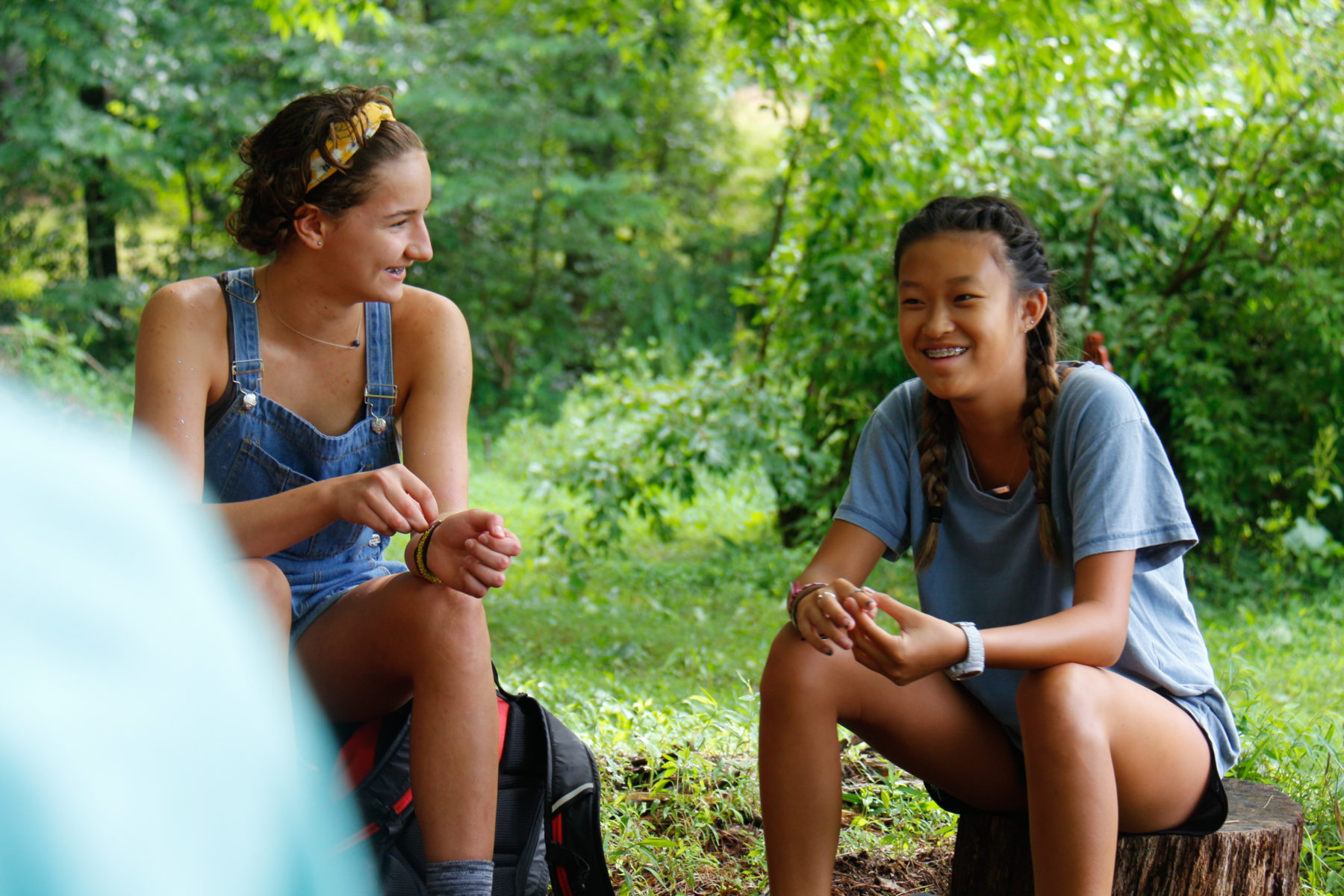By Hannah Herman, Camp Outdoor Program Manager
“I don’t know if I can do this,” I say to my friend. My hands are shaky and I have “flutter belly.” I can’t decide if I want to hide under a blanket forever or run around like a loose chicken. “I mean, I know I can, but it feels so hard now.” My friend looks at me with soft eyes and a knowing smile. She, too, has had many first days as a returning camp counselor. She reaches over to me and holds my hand. In a calm and confident tone, she reminds me that it will get easier; I will make friends, get into the routine of camp, make an impact on people’s lives, and have so much fun. She knows that this feeling will pass, and her comforting presence helps me remember just that.
I was reminded of that nervous moment and support from my friend during the “Nervous Campers and Adults” Zoom call with Beth and Ellen on Wednesday, March 12, 2025. Here are some take-aways from that call (and some of my reflections) that may be helpful for nervous campers, adults, and counselors.
Reframing and Understanding Nervousness
As Beth said during our Zoom, “Sometimes [being nervous] makes a lot of sense.” When we try new and unfamiliar things, we aren’t sure how they will go. Trying new things can be uncomfortable, and trying new things is how we learn. Another feeling that can come up when we are trying new things is excitement. Excitement can feel similar in our bodies to nervousness: sweaty hands, shaky limbs, flutter belly, bouncing energy, and more. It can be hard to tell the difference between these two feelings, and sometimes we feel both of them at the same time. When I feel nervous and excited, it’s often because I’m about to do something important to me.
Tips for Campers
- Pack things for camp that bring you comfort: pictures of your special people, your favorite stuffed animal, a cozy blanket, a book you love, etc.
- Make a list of things you want to try at camp. Share this list with a friend you make at camp, and check-in with each other to see if you’re trying new things. You could also share this list with your Junior Counselor.
- Talk to adults about how you’re feeling about camp.
- Write about or draw about how you’re feeling.
- Know what to expect when you arrive at Camp: the Junior Counselors will get your trunk for you, you’ll meet the Camp administration team, and you’ll be directed to your cabin where you’ll get to set up your space, meet your counselors, and meet your cabinmates. Your counselors and all the adults at camp will be here to help you make friends, meet new people, and learn about camp.
Tips for Adults
- Be intentional about the language you use when talking about going to camp. Stay focused on the camper’s experience (ex: I’m so excited for you, I’m curious to hear about your experience, I’m proud of you for doing this).
- Schedule a meeting with Ellen.
- Pre-send snail mail like cards, letters, and books. Ask other adults, such as grandparents or coaches, to help.
- Use Pixevity– you’ll be able to find pictures of your camper and see how they’re doing.
- Have a plan to say goodbye. Keep it short (under 5 minutes). It could include a handshake, a song. If you’re traveling with your camper, you can start to say goodbye in the car. Again, be cautious of the “I’ll miss you so much!” or “What will I do without you?!” even if joking.
- Use camp as a time for you- plan something fun to do after saying goodbye. You are going to have some energy from the drop-off, so think of ways to get it processing: movement, food, sensory experiences, novelty: all of these help you get regulated.
- Help your camper feel prepared.
- Talk to them about how they’re feeling.
- Mark the length of your session on your calendar starting today, and see how long one/two/three weeks feels.
- Practice sleeping away from home.
- Go somewhere new or try a new activity.
- Help your camper practice introducing themself to new people.
- Prepare envelopes with addresses and stamps that your camper can use to send mail while at camp.
- Watch some videos on our Camp Youtube page.
- Come to our open house (April 27, 2025).
Tips for Counselors
- Pack things for camp that bring you comfort- pictures of your special people, a favorite stuffed animal, a cozy blanket, a book you love, etc.
- Write or make art about why you’re coming to camp or what you hope to learn from this experience.
- Talk, write, or make art about how you’re feeling about camp
- Make a list of things you want to try at camp.
- Have some folks pre-send mail to camp for you.
- Start sharing with your loved ones that communication will inevitably be less frequent. Plan how you’ll balance those relationships while remaining present at camp.
- Research some fun things to do in the area for your time off. Make a list of things that help you relax and recharge.
- Watch some videos on our Camp Youtube page.
- Reach out to the A-team (administration: Ellen, Ed, Lia, or Hannah) with any questions.
- Know that this is a community of belonging. You will make friends and have amazing coworkers!
